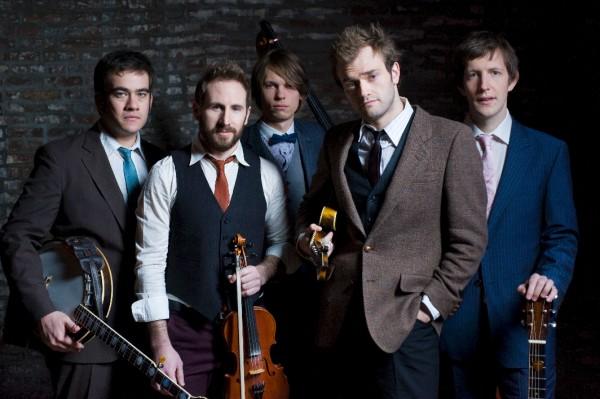Spotlight: Punch Brothers

The floor and walls seem to shake at Brooklyn, N.Y.‘s Music Hall of Williamsburg as audience members stomp their feet, dance and shout requests. Five guys onstage donning three-piece suits and smiling widely tell jokes during their performance. The soundscape moves from classical suites to old-fashioned pickin’ party-stylings to Americana and onto covers of Radiohead’s “Kid A” and of Montreal’s “Gronlandic Edit” – songs that most people would never imagine played with bluegrass instrumentation.
The Punch Brothers are at home in New York to release the group’s sophomore album, Antifogmatic. Mandolinist, lead vocalist and founder Chris Thile says, “We cover songs by musicians who approach their music in a way we love but don’t necessarily understand. It helps not only to shed light on their processes, but inspires us to incorporate what we admire most about them into our own work.”
Banjoist Noam Pikelny adds, “It’s fun to figure out the stuff going on in a song and try to make electronica sound effects work on these instruments.” Not wanting to be pigeonholed as just a bluegrass band, he laughingly refers to the group as “an acoustic band that plays original music,” “Christian with a Klezmer twist,” and “the hybrid between gospel and goth rock.”
The eclectic group began when Thile’s former progressive bluegrass band Nickel Creek was fading out in 2006 and he decided to put together a string quintet. He enlisted fiddler Gabe Witcher, banjoist Pikelny, bassist Greg Garrison (current bassist is Paul Kowert) and guitarist Chris Eldridge known as “The How to Grow a Band.” The band backed Thile on his solo release and tour, changed its name to the “The Tensions Mountain Boys” and finally became a true group under the Punch Brothers moniker – lifted from a Mark Twain short story.
In 2008, the band released Punch, centering on a four movement, 40-minute string piece that Thile scored out like a classical piece. “He originally conceived this as the first thing that would bring the band together,” says Pikelny from his home in Brooklyn’s South Slope neighborhood.
Antifogmatic’s title is a nod to a 19th century drink that people often made when they thought they were in for a hard day or rough weather. “The term was perfect – if only [this] could be an analogy for what our music could do,” Pikelny says. The band’s proclivity for alcohol references doesn’t end there: many of the record’s songs touch on drinking, barrooms and cocktails.
Until last year, the musicians were scattered across the country but when the time came to work on this record, everyone was living in Manhattan and Brooklyn. “Antifogmatic is a snapshot of our time in New York – with all of us having this new scene we were part of,” says Pikelny who explains that the band worked on the album until late at night when “people in the neighboring apartments would start yelling,” so the guys headed out to old-fashioned style cocktail bars to unwind.
Thile adds, “We’re a family now – not just co-workers that get along pretty well.”
He describes the process of creating Antifogmatic as feeling “less like we had a job to do and more like we had a life to live – simultaneously less escapable and more fun.”
Comedy and onstage banter are a big part of a Punch Brothers show. “We treat it as if we were sitting in our living rooms putting on a house concert or jamming for friends,” Pikelny says. “It can be nice relief in between pretty intense music when you give people a chance to laugh.”
Thile believes banter invites people into the band’s world “more deeply and sincerely,” and wonders, “Isn’t live music about transportation from one’s daily life to somewhere new and therefore exciting?”
The Punch Brothers have already garnered quite a following and the band has been well received by young and old fans alike. Looking around the Brooklyn venue, the audience ranges from a kid in the tie-dye Bonnaroo T-shirt, to the classical set, to hipsters singing along to of Montreal, to Americana-loving Boomers – and everything in between.
When the band members return to New York this fall after heavy touring, they plan to start writing new music. “We’ll get back to our routine and collaborating, and we’ll start drinking cocktails again – or maybe not,” Pikelny says. “I guess if we went out for pancakes every morning before we rehearse there would have to be some pancake references.”



















